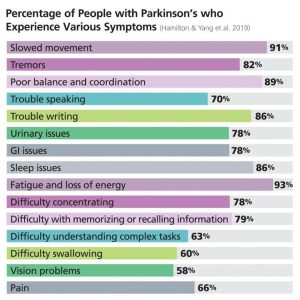
As a Dietitian I am seeing more and more people with Parkinson’s wanting to know if changing their diet can help their symptoms. To answer this question let’s first explore more about Parkinson’s and how it can affect your body.
Did you know…
On average, 38 new cases of Parkinson’s are diagnosed in Australia every day. And, it is estimated that seven to 10 million people worldwide live with this condition.
What is Parkinson’s?
Parkinson’s is a disorder of the central nervous system that occurs when brain cells that make dopamine, a chemical that coordinates movement, stop working or die. As the table below illustrates, symptoms are not just limited to movement, they are characterised by both motor (movement) and non-motor symptoms and are different from person to person.

Examples of motor symptoms
- Slowness of movement (also called bradykinesia)
- Muscle rigidity (stiff or inflexible muscles)
- Resting tremor (a rhythmic, involuntary shaking that occurs in a finger, hand or limb when it’s relaxed and disappears during voluntary movement)
- Walking problems or difficulty with balance and coordination
In addition to motor symptoms, you can also experience other health problems related to Parkinson’s. These problems are diverse and are known as non-motor symptoms and can develop years before motor symptoms.
Examples of non-motor symptoms
- Cognitive changes
- Mood changes
- Urinary problems
- Constipation
- Gastroparesis (slow stomach emptying)
- Decreased appetite
- Loss of sense of smell
- Speech and swallowing problems
- Sleeping problems
- Fatigue and loss of energy
- Weight loss or weight gain
- Postural hypotension – a form of low blood pressure that happens when you stand up from sitting or lying down
Certain non-motor symptoms such as constipation and slow stomach emptying can impact the absorption and effectiveness of levodopa. Levodopa improves motor symptoms for the majority of people with Parkinson’s so ensuring optimal absorption is important.
So, can diet help Parkinson’s?
Yes. Absolutely. Making changes to your diet can help manage some of the non-motor symptoms associated with your Parkinson’s. In particular, changes to the way you eat and drink can help deliver levodopa to your brain in a more consistent manor which in turn can help your motor symptoms. Research suggests high adherence to the MIND diet is associated with slower progression of parkinsonian signs with more moderate protective associations observed for the Mediterranean diet. A ketogenic diet has been shown to improve certain symptoms of Parkinson’s in several small studies. The great news is that research in the field of nutrition and Parkinson’s is growing and ongoing so watch this space.
Sources:
-
The Michael J. Fox Foundation
-
Living with Parkinson’s disease: An updated economic analysis 2014, Deloitte Access Economics.
-
Hamilton J, The Michael J. Fox Foundation for Parkinson’s Research, Yang W, The Lewin Group, et al. The Economic Burden of Parkinson’s Disease; 2019.
Parkinson Diet – Terms & conditions / Privacy policy



I came across your website when I Googled “Parkinson Diet”. I am a registered dietitian in the U.S. I have seen many patients with Parkinson’s disease. Many doctors referred their patients to me because they see a lot of fluctuation in their patients’ response to medication with their diet, especially protein. Since Medicare in the US does not cover nutrition counseling for patients with Parkinson’s disease, some paid me out of pocket, but many did not seek for professional help from a registered dietitian as a result of financial concerns. To fill in this gap of needs, I just published “Managing Parkinson’s with Diet”. This book includes research findings, step-by-step on how to design the meal plan, and 14 healthy breakfasts, lunches, and dinners.
Hi Yuchi,
Thanks for connecting. It’s great to hear from other Dietitians supporting people living with Parkinson’s.